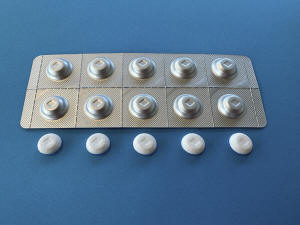LSD shows promise for reducing anxiety in drugmaker's midstage study
[September 05, 2025]
By MATTHEW PERRONE
WASHINGTON (AP) — LSD reduced symptoms of anxiety in a midstage study
published Thursday, paving the way for additional testing and possible
medical approval of a psychedelic drug that has been banned in the U.S.
for more than a half century.
The results from drugmaker Mindmed tested several doses of LSD in
patients with moderate-to-severe generalized anxiety disorder, with the
benefits lasting as long as three months. The company plans to conduct
follow-up studies to confirm the results and then apply for Food and
Drug Administration approval.
Beginning in the 1950s, researchers published a flurry of papers
exploring LSD's therapeutic uses, though most of them don't meet modern
standards.
“I see this paper as a clear step in the direction of reviving that old
research, applying our modern standards and determining what are the
real costs and benefits of these compounds,” said Frederick Barrett, who
directs Johns Hopkins University’s psychedelic center and was not
involved in the research.
Psychedelic research is rebounding
Psychedelics are in the midst of a popular and scientific comeback, with
conferences, documentaries, books and medical journals exploring their
potential for conditions like depression, anxiety and post-traumatic
stress disorder.
The FDA has designated psilocybin, MDMA and now LSD as potential
“breakthrough” therapies based on early results.
Still, the drugs have not had a glide path to the market.

Last year, the FDA rejected MDMA — also known as ecstasy — as a
treatment for PTSD, citing flawed study methods, potential research bias
and other issues.
The new LSD study, published by the Journal of the American Medical
Association, addresses some of those problems.
MDMA, like many other psychedelics, was tested in combination with hours
of talk therapy by trained health professionals. That approach proved
problematic for FDA reviewers, who said it was difficult to separate the
benefits of the drug from those of therapy.
The LSD study took a simpler approach: Patients got a single dose of LSD
— under professional supervision, but without therapy — and then were
followed for about three months.
The paper does not detail how patients were prepared for the experience
or what sort of follow-up they received, which is crucial to
understanding the research, Barrett noted.
“In many cases people can have such powerful, subjective experiences
that they may need to talk to a therapist to help them make sense of
it,” he said.
Anxiety eased but questions remain
For the study, researchers measured anxiety symptoms in nearly 200
patients who randomly received one of four doses of LSD or a placebo.
The main aim was to find the optimal dose of the drug, which can cause
intense visual hallucinations and occasionally feelings of panic or
paranoia.
At four weeks, patients receiving the two highest doses had
significantly lower anxiety scores than those who received placebo or
lower doses. After 12 weeks, 65% of patients taking the most effective
LSD dose — 100 micrograms — continued to show benefits and nearly 50%
were deemed to be in remission. The most common side effects included
hallucinations, nausea and headaches.

[to top of second column]
|

This photo provided by Catalent shows Catalent's MindMed's
formulation of LSD. (Catalent via AP)
 Patients who got dummy pills also
improved — a common phenomenon in psychedelic and psychiatric
studies — but their changes were less than half the size those
getting the real drug.
The research was not immune to problems seen in similar studies.
Most patients were able to correctly guess whether they’d received
LSD or a dummy pill, undercutting the “blinded” approach that’s
considered critical to objectively establishing the benefits of a
new medicine. In addition, a significant portion of patients in both
the placebo and treatment groups dropped out early, narrowing the
final data set.
It also wasn’t clear how long patients might continue to benefit.
Mindmed is conducting two large, late-stage trials that will track
patients over a longer period of time and, if successful, be
submitted for FDA approval.
“It’s possible that some people may need retreatment,” said Dr.
Maurizio Fava of Mass General Brigham Hospital, the study's lead
author and an adviser to Mindmed. "How many retreatments, we don’t
know yet, but the long-lasting effect is quite significant."
Interest from the Trump administration
Health Secretary Robert F. Kennedy Jr. and other administration
officials have expressed interest in psychedelic therapy, suggesting
it could receive fast-track review for veterans and others suffering
psychological wounds.
Generalized anxiety disorder is among the most common mental
disorders, affecting nearly 3% of U.S. adults, according to the
National Institutes of Health. Current treatments include
psychotherapy, antidepressants and anti-anxiety drugs like
benzodiazepines.
The possibility of using LSD as a medical treatment isn’t new.

In the 1950s and 1960s more than 1,000 papers were published
documenting LSD's use treating alcohol addiction, depression and
other conditions. But a federal backlash was in full swing by the
late 1960s, when psychedelics became linked to counterculture
figures like Timothy Leary, the ex-Harvard professor who famously
promoted the drugs as a means to “turn on, tune in and dropout.”
A 1970 law classifying LSD and other psychedelics as Schedule 1
drugs — without any medical use and high potential for abuse —
essentially halted U.S. research.
When a handful of nonprofits begin reassessing the drugs in the
1980s and 1990s, they focused on lesser-known hallucinogens like
MDMA and psilocybin, the main ingredient in magic mushrooms, to
avoid the historic controversies surrounding LSD.
“LSD was right there in front of everybody, but Mindmed is the first
company that actually decided to evaluate it,” Fava said.
All contents © copyright 2025 Associated Press. All rights reserved |